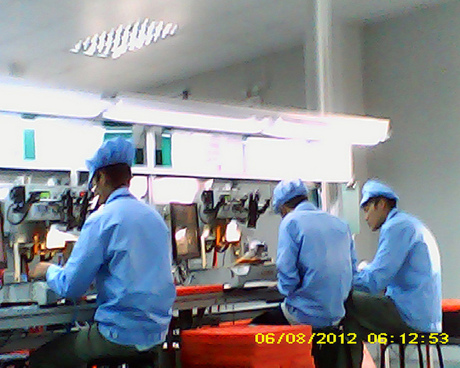Electronics companies failing to protect worker rights

The electronics industry has failed to do enough to protect the rights of workers within their supply chain and ensure that their products do not indirectly support forced labour, child labour and exploitation, a new report shows.
The report from Baptist World Aid found that none of 50 electronics companies studied received an A grade during an evaluation of their supply chain. The highest grade awarded was a B+.
But Dick Smith was among the best performers and one of only two companies able to demonstrate that they had taken measures to address poverty level wages since last year. The company was among the five most improved companies from the 2015 report, lifting its grade from a D to a B-.
Companies were graded based on four pillars of labour rights management — policies, traceability and transparency, monitoring and training, and worker rights.
Companies willing to cooperate with the research, who have systems in place to reduce the risk of worker exploitation in the factories making their products, were more likely to receive a higher grade.
The median grade for the this year’s report was C. This suggests that workers within the electronics supply chain remain overworked and underpaid, with many still not receiving a living wage capable of paying for the basics of food, water, shelter and electricity.
Gershon Nimbalker, Baptist World Aid’s advocacy manager, commented that of the four Australian companies monitored for the report, only Dick Smith cooperated with the researchers.
“While we attempted on many occasions to contact Soniq, Palsonic and Kogan (and have confirmation that they all received our enquiries), all three companies chose not to engage with the research process,” he said.
“Without that transparency, consumers, investors and the public can’t be sure that these companies are protecting the workers that make their products from exploitation and slavery.”
As a result, besides Dick Smith, Australian electronics companies were among the worst rated on the list. Soniq and Kogan received a D-, while Palsonic got a failing grade.
Nimbalker said Dick Smith also substantially improved its supply chain auditing process by, for example, collecting wage data and benchmarking it against minimum wages.
“Through collecting this data we could demonstrate [that] in a number of regions in China, their factories were paying above the minimum wage. This is the first step towards ensuring workers are receiving a living wage, and something that Dick Smith was commended for in our report,” he said.
When asked what the electronics industry can do to improve the conditions of workers within their supply chain, Nimbalker said that regardless of industry, if worker rights are to be upheld companies need to move from a transactional approach towards suppliers to one that is far more relational.
“Those companies that have long-term relationships with their supply chains, have concentrated order volumes through fewer suppliers and worked to communicate that workers’ rights are critical to their production process are consistently the companies we see that have driven the most improvements to workers,” he said.
Ethical and sustainable supply chain consultant Kate Nicholl added that companies are starting to develop policies their suppliers must meet in terms of health and safety, worker conditions and environmental impact — and to audit their suppliers for compliance.
“Unfortunately, this only just scratches the surface of the issue. The nub of the problem lies in the lack of transparency in the extended supply chain — meaning that there is no visibility into the practices of the suppliers’ supplier and so forth,” she said.
“Although the brand may monitor the practices of the manufacturer, they have no visibility over the components manufacturer, or the provider of raw materials, and so no way of knowing if the product is ‘clean’ of slavery or other forms of humanitarian abuses such as child labour.”
To truly tackle the issue, the manufacturer needs to be able to demonstrate who their suppliers are and that they comply with worker safety standards, she said. The challenge for the electronics industry is gaining access to this data.
“The other thing that electronics companies can do to improve conditions of workers is to start insisting that their suppliers (and also suppliers’ supplier) pay a living wage to workers,” she concluded.
Agentic AI reality check: don't confuse hype with readiness
Agentic AI is here, but are banks ready for the transformation?
Shadow AI exposes the cost of slow governance
Shadow AI is what happens when governance fails to keep pace with experimentation,...
How agentic AI will revolutionise customer experience in Australia
Agentic AI is changing the way that Australian businesses are adopting AI technologies.




